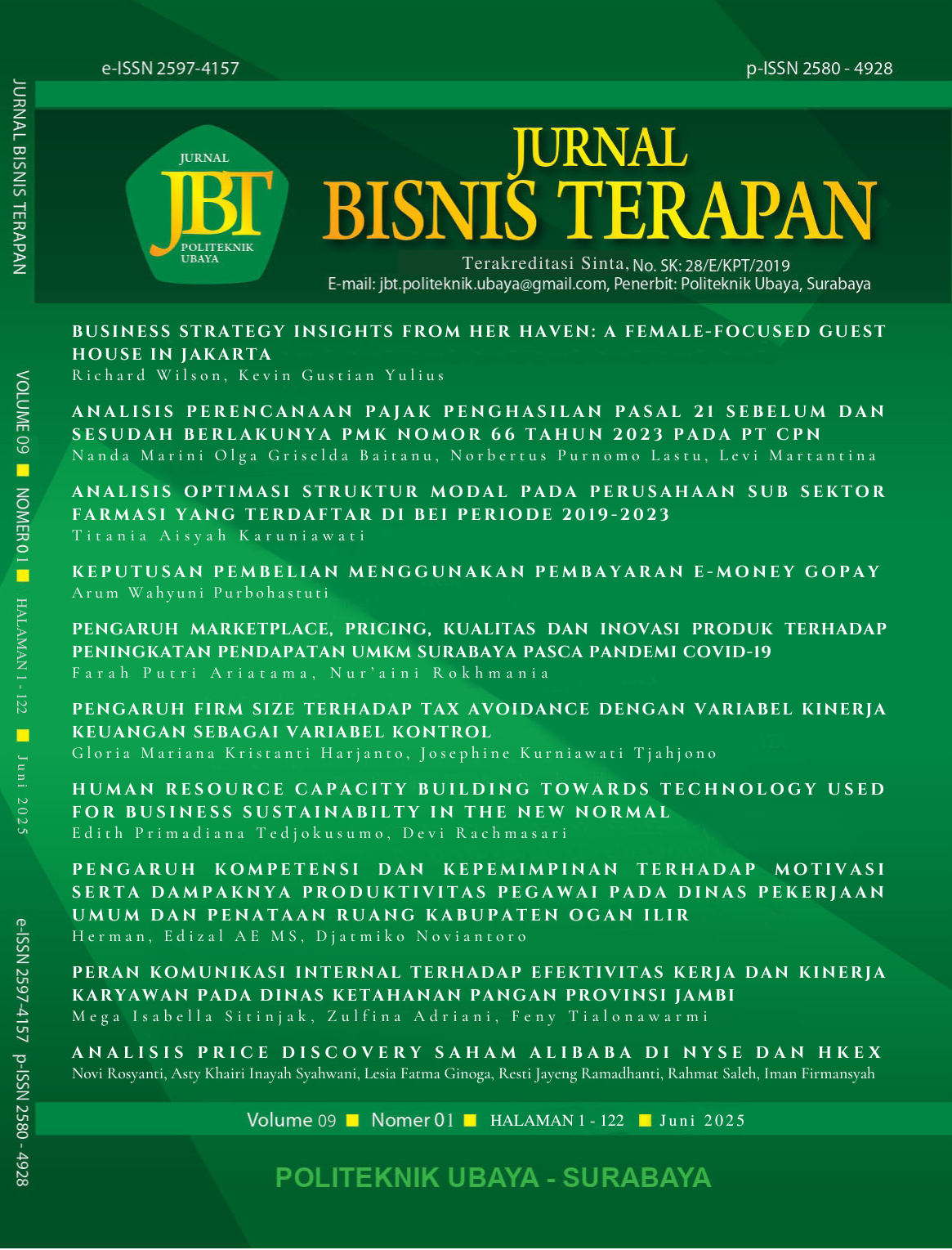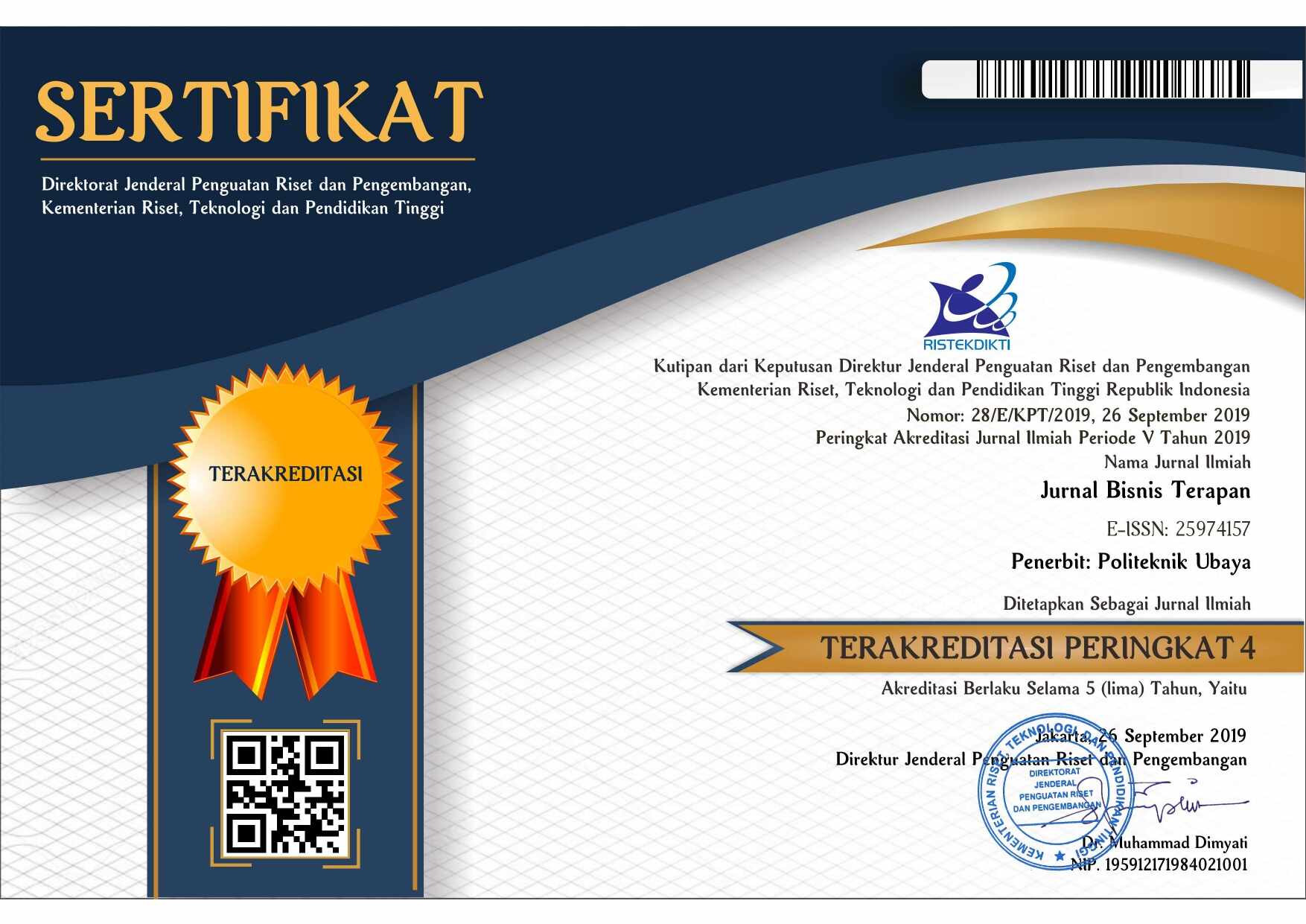BUSINESS STRATEGY INSIGHTS FROM HER HAVEN: A FEMALE-FOCUSED GUEST HOUSE IN JAKARTA
 Abstract Views:
213 times
Abstract Views:
213 times
 PDF Downloads:
150 times
PDF Downloads:
150 times
Abstract
The increasing demand for safe and exclusive accommodations among female travellers highlights a significant gap in the hospitality industry, particularly in urban centers like Jakarta. Her Haven Guest House aims to address this need by offering women-only lodging that prioritizes safety, comfort, and personalized experiences. This study analyses the marketing strategies required to establish Her Haven Guest House as a leading provider in this niche market. The research employs a mixed-methods approach, combining surveys, observations, and secondary data analysis to assess consumer preferences and market dynamics. Primary data was gathered through an online survey of 165 women aged 21-54 in the Greater Jakarta area, revealing a strong preference for women-only accommodations. The study applies the 8Ps marketing mix framework—Product, Price, Place, Promotion, People, Packaging, Programming, and Partnerships—to develop actionable strategies for the guest house. Additionally, a SWOT analysis identifies key strengths, weaknesses, opportunities, and threats, guiding strategic recommendations. The findings indicate that Her Haven Guest House can leverage its unique concept and strategic location to attract female travellers seeking security and exclusivity. The results highlight the importance of digital marketing, loyalty programs, and themed events in building brand awareness and customer loyalty. Furthermore, the study provides insights into managerial strategies to enhance service quality and policy recommendations for government support in promoting inclusive tourism. By addressing the specific needs of female travellers, Her Haven Guest House has the potential to contribute to the broader landscape of sustainable and inclusive hospitality.
Downloads
References
Aguinis, H., Kraus, S., Poček, J., Meyer, N., & Jensen, S. H. (2023). The why, how, and what of public policy implications of tourism and hospitality research. Tourism Management, 97, 104720. https://doi.org/10.1016/j.tourman.2023.104720
Alamineh, G. A., Hussein, J. W., Endaweke, Y., & Taddesse, B. (2023). The local communities’ perceptions on the social impact of tourism and its implication for sustainable development in Amhara regional state. Heliyon, 9(6), e17088. https://doi.org/10.1016/j.heliyon.2023.e17088
Ayalasomayajula, D., & Sawadkar, A. (2018). Observational Research in Advertising, Marketing, and Branding (pp. 199–207). https://doi.org/10.4018/978-1-5225-3150-0.ch011
Chauhan, A., Shukla, A., & Negi, P. (2018). Safety and Security Measures Adopted by the Hotels and Their Impact on Customer Relationship Management. International Journal of Research -GRANTHAALAYAH, 6(1), 118–125. https://doi.org/10.29121/granthaalayah.v6.i1.2018.1600
Cikal. (2024). 23 Years of Research on Market Positioning: A Future Research Agenda. Ekonomi Dan Bisnis, 11(1), 12–24. https://doi.org/10.35590/jeb.v11i1.7575
Cuka, P., Kruczek, Z., & Szromek, A. (2015, June 20). Observation As A Basic Qualitative Method In Tourism Research: Case Study Donovaly Slovakia. 15th International Multidisciplinary Scientific GeoConference SGEM 2015. https://doi.org/10.5593/SGEM2015/B21/S8.096
Dwivedi, Y. K., Ismagilova, E., Hughes, D. L., Carlson, J., Filieri, R., Jacobson, J., Jain, V., Karjaluoto, H., Kefi, H., Krishen, A. S., Kumar, V., Rahman, M. M., Raman, R., Rauschnabel, P. A., Rowley, J., Salo, J., Tran, G. A., & Wang, Y. (2021). Setting the future of digital and social media marketing research: Perspectives and research propositions. International Journal of Information Management, 59, 102168. https://doi.org/10.1016/j.ijinfomgt.2020.102168
Emara, O. A. M., Halim, H. T., El-Deeb, M. S., & Halim, Y. T. (2023). Toward a sustained recovery of the lodging sector: a management path to lessen the Corona Variants upshots. Future Business Journal, 9(1), 1. https://doi.org/10.1186/s43093-022-00171-3
Ghai, A., & Chowdhri, S. (2022). Study On Hotel Trends Designed For Single Lady Travelers. PUSA Journal of Hospitality and Applied Sciences, 8(1), 47–61. https://doi.org/10.48165/pjhas.2022.8.1.4
Giannoukou, I. (2024). Revolutionizing Hospitality: Strategic Integration of Innovation Management Embracing Technological Innovation for Enhanced Customer Experiences. Technium Business and Management, 7, 24–39. https://doi.org/10.47577/business.v7i.10585
Hamdy, M. K., & Hudri, M. (2022). Gender Based Violence: The Relationship of Law and Patriarchy in Indonesia. EMPATI: Jurnal Ilmu Kesejahteraan Sosial, 11(2), 73–85. https://doi.org/10.15408/empati.v11i2.29751
Hao, J. S. C., & Har, C. O. S. (2014). A Study of Preferences of Business Female Travelers on the Selection of Accommodation. Procedia - Social and Behavioral Sciences, 144, 176–186. https://doi.org/10.1016/j.sbspro.2014.07.286
Harrison, R. L., & Reilly, T. M. (2011). Mixed methods designs in marketing research. Qualitative Market Research: An International Journal, 14(1), 7–26. https://doi.org/10.1108/13522751111099300
Harumain, Y. A. S., Barus, L. S., & Fauzi, N. (2024). Women’s Perspectives on Public Transportation in Jakarta, Indonesia – Reliability and Service Quality Insights. Journal of Strategic and Global Studies, 7(2), 127–147. https://doi.org/10.7454/jsgs.v7i2.1143
Hulland, J., Baumgartner, H., & Smith, K. M. (2018). Marketing survey research best practices: evidence and recommendations from a review of JAMS articles. Journal of the Academy of Marketing Science, 46(1), 92–108. https://doi.org/10.1007/s11747-017-0532-y
Ingrassia, M., Bellia, C., Giurdanella, C., Columba, P., & Chironi, S. (2022). Digital Influencers, Food and Tourism—A New Model of Open Innovation for Businesses in the Ho.Re.Ca. Sector. Journal of Open Innovation: Technology, Market, and Complexity, 8(1), 50. https://doi.org/10.3390/joitmc8010050
Jamshed, S. (2014). Qualitative research method-interviewing and observation. Journal of Basic and Clinical Pharmacy, 5(4), 87. https://doi.org/10.4103/0976-0105.141942
Japutra, A., & Situmorang, R. (2021). The repercussions and challenges of COVID-19 in the hotel industry: Potential strategies from a case study of Indonesia. International Journal of Hospitality Management, 95, 102890. https://doi.org/10.1016/j.ijhm.2021.102890
Joshi, A., Kale, S., Chandel, S., & Pal, D. (2015). Likert Scale: Explored and Explained. British Journal of Applied Science & Technology, 7(4), 396–403. https://doi.org/10.9734/BJAST/2015/14975
Joshi, M. (2021). To study women ’s only floor -a new changing trend in hotel industry. International Journal of Scientific Research in Engineering and Management, 5(7), 1–5.
Kakooza, J., Tusiime, I., Namiyingo, S., Nabwami, R., & Basemera, M. (2023). Business choice, location decision and success of small and medium enterprises in Uganda. Journal of Money and Business, 3(1), 108–121. https://doi.org/10.1108/JMB-08-2022-0041
Keshavarz, Y., Aziz, Y. A., Jamshidi, D., & Ansari, Z. (2019). A comparative study of outcome quality, perceived value, and loyalty in four-star and five-star hotels. International Journal of Tourism Cities, 5(2), 270–287. https://doi.org/10.1108/IJTC-07-2018-0048
Kusumarini, I., Diwyarthi, N. D. M. S., Citrawati, L. P., Darmiati, M., & Wiartha, N. G. M. (2024). Preferensi Wisatawan Perempuan terhadap Keputusan Membeli dan Menginap pada Hotel Ramah Lingkungan dan Berkelanjutan di Kabupaten Karangasem. Edu Cendikia: Jurnal Ilmiah Kependidikan, 4(02), 408–420. https://doi.org/10.47709/educendikia.v4i02.4505
Li, K. X., Jin, M., & Shi, W. (2018). Tourism as an important impetus to promoting economic growth: A critical review. Tourism Management Perspectives, 26, 135–142. https://doi.org/10.1016/j.tmp.2017.10.002
Li, Y., Xia, L., Wang, L., Qiu, M., & Utomo, S. (2024). How Are Rural Homestays Achieving Sustainable Development in the Post-COVID-19 Period: Value Co-Creation by Operators, Tourists, and Government. Sustainability, 16(3), 1088. https://doi.org/10.3390/su16031088
Macak, T., Hron, J., & Jadrna, M. (2020). Diversification of accommodation offers depending on critical economies of scale for travel business. Cogent Business & Management, 7(1), 1746170. https://doi.org/10.1080/23311975.2020.1746170
Mahmud, N., & Habib, M. A. (2024). A Comprehensive Business Location Choice Model Leveraging Machine Learning in Systematic Choice Set. Transportation Research Record: Journal of the Transportation Research Board. https://doi.org/10.1177/03611981241253609
Mapjabil, J., Mohd Hamiza, N., M.Z., R., Marzuki, M., Yusoh, M. P., Stephen, J., Datu Eranza, D. R., Kanyo, N.-I., Andin, C., & Mohd Salleh, N. (2021). Awareness of Female Tourists on Aspects of Safety and Security Threats While on Vacation in Kota Kinabalu. Journal of Tourism, Hospitality and Environment Management, 6(24), 54–70. https://doi.org/10.35631/JTHEM.624006
Morrison, A. M. (2022). Tourism Marketing. Routledge. https://doi.org/10.4324/9781315856094
Panteleiev, V. (2023). Application of SWOT analysis to justify the strategy of hotel business enterprises. Technology Audit and Production Reserves, 1(4(69)), 14–19. https://doi.org/10.15587/2706-5448.2023.274918
Patwal, A. S., Rana, V., & Pathak, V. K. (2023). Predictors Influencing the Choice of Lodging Option: A Systematic Literature Review of Homestays. Journal of Tourism and Services, 14(26), 263–284. https://doi.org/10.29036/jots.v14i26.536
Prabawati, D., Anggraeni, L., Novita, R., & Artina, N. N. (2022). Program on Violence against Women and Children for DKI Jakarta residents. KAIBON ABHINAYA : JURNAL PENGABDIAN MASYARAKAT, 4(2), 214–220. https://doi.org/10.30656/ka.v4i2.3354
Prakosa, R. M. (2023). Information Technology Implementation (Digitalization) on Booking and Payment Online System to Village’s Tourism Product in Bali. Journal of Tourism and Creativity, 7(1), 32. https://doi.org/10.19184/jtc.v7i1.37868
Pulse Lab, & UN Women. (2019). After Dark: Encouraging Safe Transit for Women Travelling at Night. Pulse Stories.
Pusat Data dan Sistem Informasi Kemenparekraf. (2023). Perkembangan Usaha Akomodasi Menurut Klasifikasi Akomodasi, 2010 - 2022.
Puyt, R. W., Lie, F. B., & Wilderom, C. P. M. (2023). The origins of SWOT analysis. Long Range Planning, 56(3), 102304. https://doi.org/10.1016/j.lrp.2023.102304
Seyfi, S., Vo-Thanh, T., & Zaman, M. (2024). Hospitality in the age of Gen Z: a critical reflection on evolving customer and workforce expectations. International Journal of Contemporary Hospitality Management, 36(13), 118–134. https://doi.org/10.1108/IJCHM-01-2024-0035
Simorangkir, C. O., Ramadhan, G., Sukran, M. A., & Manalu, T. (2024). Tourism Development Impact on Economic Growth and Poverty Alleviation in West Java. Jurnal Kepariwisataan Indonesia: Jurnal Penelitian Dan Pengembangan Kepariwisataan Indonesia, 18(2), 175–196. https://doi.org/10.47608/jki.v18i22024.175-196
Sobel, C. (2023, August 15). SOAR, SWOT and SMART: The Prescription for Small Business Growth. https://www.linkedin.com/pulse/soar-swot-smart-prescription-small-business-growth-craig-sobel
Sofiani, Yulius, K. G., & Hardjasa, G. E. (2024). Analisis Potensi Sumber Daya Manusia Dalam Bisnis Akomodasi Pondok Wisata Di Desa Wisata Besani. Jurnal Ilmiah Global Education, 5(1), 635–645. https://doi.org/10.55681/jige.v5i1.2473
Tracey, B., & Swart, M. P. (Nellie). (2020). Training and development research in tourism and hospitality: a perspective paper. Tourism Review, 75(1), 256–259. https://doi.org/10.1108/TR-06-2019-0206
Trebicka, B., Tartaraj, A., & Harizi, A. (2023). Analyzing the relationship between pricing strategy and customer retention in hotels: A study in Albania. F1000Research, 12, 690. https://doi.org/10.12688/f1000research.132723.1
Tremblay, G., Poirier, A., & Monfort, L. (2024). Value-based pricing: a potential solution to difficult pricing discussions and payers’ negotiations. Journal of Medical Economics, 27(1), 344–347. https://doi.org/10.1080/13696998.2024.2317119
Unachukwu, L. C., Kalu, A. O. U., & Ibiam, O. (2018). Accessing Secondary Data : A Literature Review. Singaporean Journal of Business Economics and Management Studies, 6(6), 53–63. https://doi.org/10.12816/0048423
Waehama, A. (2022). Analisis Strategi Pemasaran Dengan Metode SWOT Analysis dan Marketing Mix. Jurnal Agroindustri Pangan, 1(1), 32–45. https://doi.org/10.47767/agroindustri.v1i1.437
Wang, Y., & Tziamalis, A. (2023). International tourism and income inequality: The role of economic and financial development. Tourism Economics, 29(7), 1836–1864. https://doi.org/10.1177/13548166231177106
Yozukmaz, N. (2024). The Bold and the Beautiful: A Literature Review on Solo Female Travellers. In Future Tourism Trends Volume 2 (pp. 209–221). Emerald Publishing Limited. https://doi.org/10.1108/978-1-83753-970-320241013
Yulius, K. G., Hezkiel, J., Hans, S., & Vivian, V. (2019). Pengaruh Pelaksanaan Program Pelatihan Kerja dan Pengembangan Karir terhadap Kinerja Pegawai di Hotel Fairmont Sanur Beach Bali Bagian Room Division. Jurnal Ilmiah Pariwisata, 24(2), 150. https://doi.org/10.30647/jip.v24i2.1308
Zhang, J., Lai, I. K. W., & Wong, J. W. C. (2024). Female travellers in hospitality and tourism industry: A systematic literature review. Heliyon, 10(5), e27256. https://doi.org/10.1016/j.heliyon.2024.e27256
Zhou, F., Huang, S., & Matthews, M. (2024). Understanding Solo Female Travellers in Canada: A Two-Factor Analysis of Hotel Satisfaction and Dissatisfaction Using TripAdvisor Reviews. Tourism and Hospitality, 5(1), 167–186. https://doi.org/10.3390/tourhosp5010012
Ziadie, H. G., Sembiring, M. T., & Sembiring, B. K. F. (2023). Marketing Mix Strategy Using SWOT Analysis to Increase Market Share in PT Smartfren Telecom Tbk North Sumatera Area (pp. 930–936). https://doi.org/10.2991/978-94-6463-008-4_116


This work is licensed under a Creative Commons Attribution-NonCommercial-ShareAlike 4.0 International License.

Ciptaan disebarluaskan di bawah Lisensi Creative Commons Atribusi-NonKomersial-BerbagiSerupa 4.0 Internasional.
-
Articles published in Jurnal Bisnis Terapan are licensed under a Creative Commons Attribution-NonCommercial-ShareAlike 4.0 International (CC BY-NC-SA 4.0) license, which permits anyone to copy, transform, or redistribute articles for any lawful purpose in any medium, provided appropriate credit is given to the original author(s) and Jurnal Bisnis Terapan is recognized as its original publisher. A link to this license should also be provided. Any derivative work of an article published in Jurnal Bisnis Terapan must also be shared under the same (or compatible) license.
-
Both copyright and publishing rights on articles are retained by the respective author(s), without restrictions. Only a non-exclusive license is granted to Jurnal Bisnis Terapan to publish the article and identify itself as its original publisher.

 DOI:
DOI:






